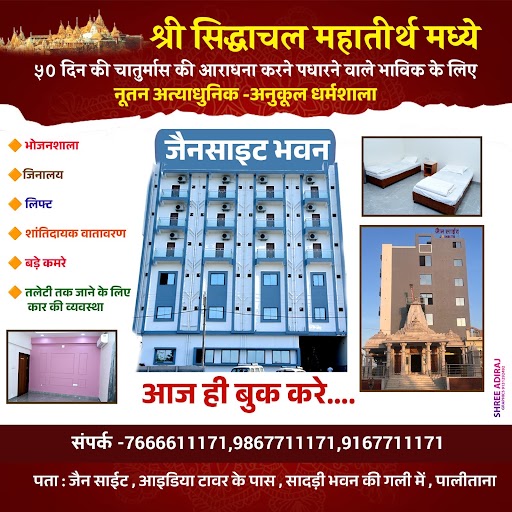Life of Bhagawän Mahävir
3.1 Previous Lives
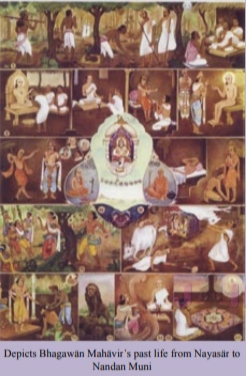
Depicts Bhagawän Mahävir’s past life from Nayasär to Nandan Muni
The lives of Bhagawän Mahävir are counted from his life as that of Nayasär, when he attained self- realization (Samyaktva). The significant lives are Nayasär (birth no. 1), Marichi (birth no. 3), Triprushtha Väsudev (birth no. 16), Vishvabhuti (birth no. 18),
Priyamitra Chakravarti (birth no. 23) and Nandan Muni (birth no. 25).
It is in the life of Nandan Muni that he attained Tirthankar Näm-Karma. At the end of that life he was born as a Deva. Then, in the third life after Nandan Muni, he was born as Vardhamän Mahävir.
3.2 Birth and Childhood
It is believed that all Tirthankars are born in the Kshatriya (warrior) royal family because it provides a surrounding that helps a realized person to understand that there is no permanent happiness in material comfort.
Queen Trishalä, just like the mother of any other Tirthankar, saw 14 objects in her dreams: lion, elephant, bull, Lakshmi, garland, full moon, sun, flag, vase, lotus lake, ocean, celestial plane, heap of jewels,
smokeless fire, adding (Digambar tradition believes the mother sees 16 dreams, adding a pair of fish and a throne). When her husband, King Siddhärtha, asked the dream interpreters and scholars the meaning of the dreams, they proclaimed that Queen Trishalä would give birth to a Tirthankar.
While in the womb, Bhagawän Mahävir had once been very still so as not to disturb and provide any pain to his mother. Not feeling any movement Queen Trishalä was very worried that something was wrong with the baby in the womb. Realizing how worried his mother had been on his behalf, he had decided not to take the religious vow of Renunciation and leave his family while his parents were alive.
Soon after his birth Indra (king of heavenly gods) takes the baby Tirthankar to Mount Meru and performs the birth ceremony (Janma Abhisheka) with great rejoicing and celebration. After that he returns the baby to mother Trishalä’s bedside.
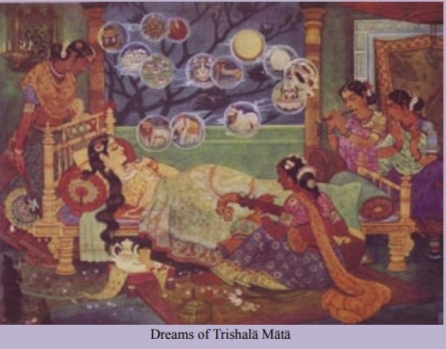
Dreams of Trishalä Mätä
Mahävir’s Life
(Rhyme – Mary had a Little Lamb)
Trishalä Mätä had many dreams, many dreams, many dreams, Trishalä Mätä had many dreams, They were special.
It meant a baby Tirthankar, Tirthankar, Tirthankar, It meant a baby Tirthankar, Who was on his way.
He was showered on Meru Shikhar, Meru Shikhar, Meru Shikhar, He was showered on Meru Shikhar, By Indra Bhagawän.
He was very strong and brave, Strong and brave, strong and brave, He was very strong and brave, Which means Mahävir.
When he was thirty, Thirty, thirty, When he was thirty, He took Dikshä.
He saved Chandan, Chandkaushik, Chandkaushik, Chandkaushik He saved Chandan, Chandkaushik, And faced many troubles.
After lots of Käusagga, Käusagga, Käusagga, After lots of Käusagga, He achieved Keval-jnän.
Satya, Ahimsä saves us all, Saves us all, saves us all, Satya, Ahimsä saves us all, That’s what he said.
He overcame all his Karma, All his Karma, all his Karma, He overcame all his Karma, And reached Moksha.
Moksha is where we want to go, Want to go, want to go, Moksha is where we want to go, And not be born again.
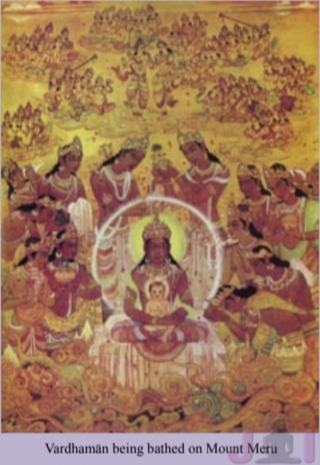
Vardhamän being bathed on Mount Meru
There is great rejoicing in the country. The family is blessed with increasing goodwill, respect, wealth, and mutual affection, and everyone prospers. Gold and gems increased in the treasury of the kingdom. The general health, peace, happiness, and goodwill of the people increased many-fold. Thus, since the moment his soul was conceived there was continued enhancement in glory, wealth, health and fame. This is the reason the baby was named Vardhamän, which means ever-increasing prosperity.
There are numerous incidences of courage and forgiveness throughout Vardhamän’s life as a child and an adult.
One day prince Vardhamän, a
young boy of eight, was playing with his friends on the outskirts of the city. At that very moment Indra, the king of heaven, started praising the courage, valor, bravery and fearlessness of prince Vardhamän. Another heavenly god challenged the statement believing that fear is present in all humans. He decided to test Vardhamän’s courage. In order to frighten the child he assumed the form of a formidable and frightening cobra and slithered near the tree where the children were playing. All the boys were frightened and started screaming but Mahävir stood there calm and completely fearless. He gently caught the cobra with his hands and placed it in the grass on the side.
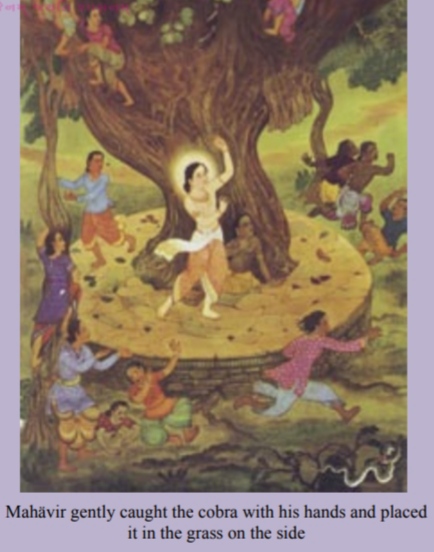
Mahävir gently caught the cobra with his hands and placed it in the grass on the side
The god, who failed to frighten prince Vardhamän in the form of a cobra, decided to test his bravery again. Assuming the form of an ordinary child he joined the group of children and suggested playing Tindushak game. This game was a race to a target tree. The winner was to ride piggyback on one of the losers and return to the base. The heavenly god lost the game to prince Vardhamän and offered to carry him on his shoulders. However, as soon as he had the prince on his shoulders the god assumed a gigantic form. Without any fear Prince Vardhamän gave a mighty blow on his shoulder with clenched fists. The god could not withstand the blow and assuming his original form bowed to the prince and returned to heaven. Indra and all the other heavenly gods hailed the victory of prince Vardhamän and exclaimed that he was ‘Mahävir’ – ’The Great Hero’. When Vardhamän was nine years old his parents thought that it was time to impart formal education and teach him martial arts
befitting a Kshatriya prince. They decided to send him to school.
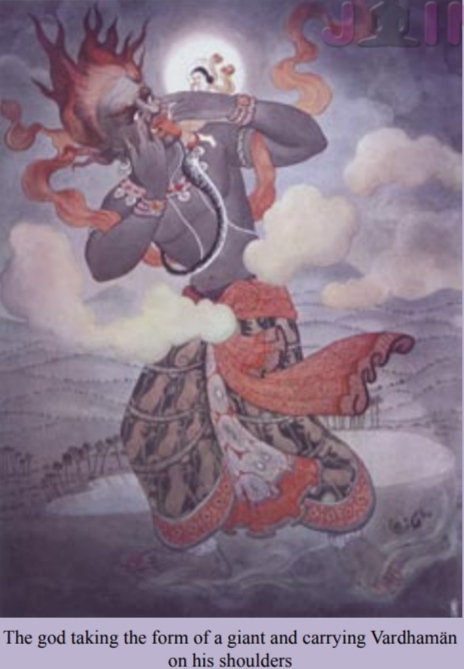
The god taking the form of a giant and carrying Vardhamän on his shoulder
When Vardhamän went to school he offered his respects to the teacher just like an ordinary child. The teacher taught him the first lesson and realized that Vardhamän is a very knowledgeable boy. The teacher also realized that Vardhamän is more knowledgeable than himself.
After these incidences, his schooling ended and he returned to the palace.
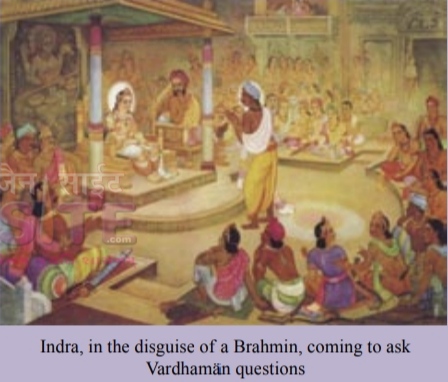
Indra, in the disguise of a Brahmin, coming to ask Vardhamän questions
Preparation for Renunciation
As a youth Prince Vardhamän lived a very simple and disciplined life. He wanted to renounce the world in search of eternal happiness. However, while he was in his mother’s womb, he had decided not to
leave the family while his parents are alive.
At the age of 28, his parents passed away. He was now ready to take Dikshä. So, he requested his older brother, Nandivardhan, to permit him to take Dikshä. Realizing that his younger brother was not an ordinary
person Nandivardhan requested him to postpone his decision for two years, as he was still grieving for their parents’ death.
Prince Vardhamän led a very simple life for one year. When he had exactly one more year of a householder’s life left, Prince Vardhamän started donating all his belongings and wealth to the needy and to all those who came to him. Everyday, he would donate many gold coins, jewels, precious stones, and clothes. This unique and unprecedented charity impressed on the minds of the people that ‘Charity is a double blessing – it blesses those who give and also those who receive’.
At the end of the year that was marked by generosity, Prince Vardhamän had attained perfect ‘Aparigrahatva’ – Freedom from attachment for possession. He was now fully prepared for the life of a monk. His elder
brother made elaborate preparations for the initiation. There was great excitement and enthusiasm throughout the country. Indra and other heavenly gods participated in the ceremony. Gold and silver pitchers filled with water from various holy places were prepared. The prince was anointed with perfumed pastes and bathed with holy waters. He was dressed in royal garments and decked with precious ornaments. They carried him in a palanquin in a grand procession on the tenth day of the dark half of month of Märgashirsh. On this day at an auspicious moment Prince Vardhamän left the palace forever. Indra and the other gods carried the palanquin on their shoulders.
3.3 Renunciation
After alighting from the palanquin, Prince Vardhamän removed all the garments and ornaments and handed them over to Indra. He stood under an Ashok tree and in the presence of thousands of people took the solemn vow of renunciation. He plucked all the hair on his head in four handfuls and the hair on his chin and lips in one handful. This is known as Panchamusthi loch. Mahävir solemnly recited the words, “I bow down to all the liberated souls”, and accepted life-long renunciation. He took the five great vows of non-violence, truth, non-stealing, celibacy, and non-possession in order to avoid accumulation of any new Karma in the future and to annihilate past Karma. Indra then placed a divine piece of cloth called Devadusya on his left shoulder. Right after initiation (Dikshä) Bhagawän Mahävir acquired the ‘Manah-Paryäya Jnän’ knowledge that allowed him to perceive the feelings and thoughts of all living beings.
Rejecting Indra’s Protection
Bhagawän Mahävir, an embodiment of perfect renunciation, detachment, and Ahimsä, once reached the outskirts of a village named Kurmäragräm. He stood under a tree motionless and absorbed in deep meditation. A cowherd approached Mahävir and asked him to look after his bullocks while he visited the village. On his return the cowherd found that the bullocks were missing. He asked Bhagawän Mahävir but received no reply as Mahävir was observing the vow of silence. The cowherd searched for his bullocks throughout the night, but failed to locate them. In the morning he returned to the same spot and found the bullocks seated by the side of the standing saint. Thinking that Bhagawän Mahävir was a thief in disguise, he became furious and rushed towards Mahävir, with the intention of thrashing him with his whip. Indra, however, intervened and explained to him that the saint is not an ordinary wandering mendicant, but prince Vardhamän, son of king Siddhärtha, who had recently accepted initiation.
Indra asked Mahävir if he could provide protection. Mahävir replied in all humility that an ascetic on a spiritual path reaches his goal of purity with the help of his own practice, courage, and discipline. It is without the help of heavenly gods or humans that one should shed all its Karma to attain liberation. On hearing this, Indra bowed with reverence and departed.
Afflictions by Sulpäni
When the wandering Bhagawän Mahävir came to a village called Asthikagräm, he wanted to spend the night in the temple dedicated to a demon (Yaksha) called Sulpäni. The villagers warned him that the wicked Yaksha tortures to death any traveler who spends the night in that shrine. But Mahävir insisted on staying there overnight. The Yaksha became enraged and furious as he thought that this was a challenge to his powers. He tried to frighten Bhagawän Mahävir by assuming various forms of a ghost, an elephant, a cobra, a lion, but he did not succeed. He then tried to pierce his eyes, ears, nose, head, nails and back. Even this extreme agony failed to pierce the serenity of his composure. Sulpäni was drained of all his demonic energy, and a divine spiritual light illuminated in him. Slowly his anger subsided, fear dissolved, and a feeling of goodwill took over. He touched Mahävir’s feet and with repentance and humility begged Mahävir’s pardon.
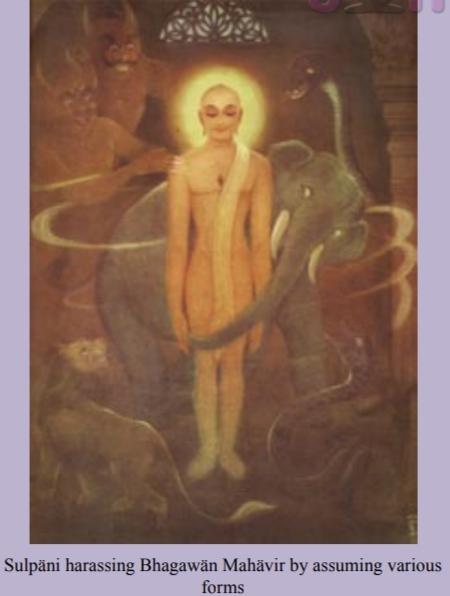
Sulpäni harassing Bhagawän Mahävir by assuming various forms
Chandkaushik
Leaving Asthikagräm Mahävir proceeded in the direction of Shvetämbikä town. The trail to this town passed through a dense and desolate forest. When some shepherds saw Mahävir entering the forest they warned him about the black cobra with a venomous
gaze living on the trail. The cobra’s hissing and gaze burnt plants and trees, while flying birds and standing humans dropped dead. As a result no one crossed the forest where the cobra lived. Bhagawän Mahävir knew this by his divine knowledge and in order to
enlighten the cobra by his universal love he entered the forest and stood motionless in meditation near the place where the cobra resided. The proud king-cobra rushed out of its hole, hissing and gazing at Bhagawän Mahävir. But Mahävir stood motionless and unperturbed. Blind with rage, the cobra sank his fangs into Mahävir’s toe and injected all his venom. But a milk-like substance started flowing from his toe. Bhagawän Mahävir cast a gentle glance of compassion and said, “O Chandkaushik, be enlightened and attain peace of mind. Do not inject the venom of anger in your life.” When the cobra met Mahävir’s gaze, it felt as if a wave of peace and tranquility had engulfed his inner self. The cobra started contemplating and visualized his past lives (Jätismaran jnän) and realized that it had suffered excruciating pain and degradation due to extreme anger and acute attachment during his previous two births. He was full of repentance. He vowed not to look at anyone for the rest of his life, nor eat or drink anything. He decided to lie still and atone for all his sins committed during the last three births and improve his future.
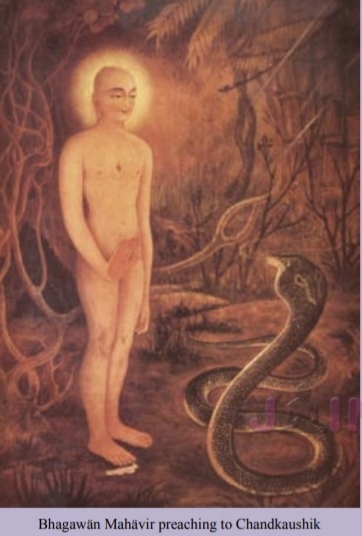
Bhagawän Mahävir preaching to Chandkaushik
Chandanbälä
During the twelfth year after initiation Bhagawän Mahävir entered the city of Kaushämbi after a long penance. He had decided to accept alms only from a person who fulfilled his following unspoken conditions – He would accept an Urad preparation from the corner of a winnowing basket, given by a person with one leg on the threshold and the other outside, who was a princess turned into a slave, who had a shaven head and whose legs were bound by chains. She must be a chaste woman, performing the penance of Attham (three days of fasting) and should serve him with tears in her eyes. Five months and twenty- five days elapsed, but no donor fulfilled these conditions. Chandanbälä, a princess sold as a slave, shackled and shaved by the jealous wife of a rich merchant fulfilled all the conditions except tears in her eyes. Bhagawän Mahävir turned his face away at the last moment without accepting her humble alms. This made Chandanbälä weep and the last condition being realized Bhagawän Mahävir accepted the alms.
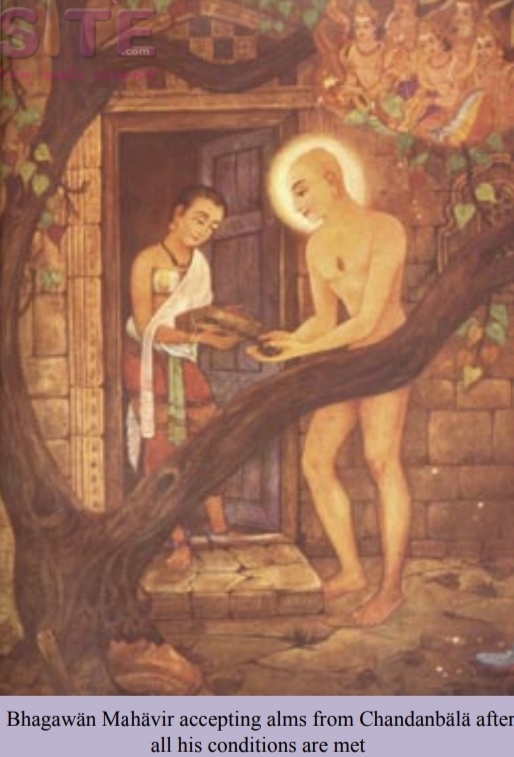
Bhagawän Mahävir accepting alms from Chandanbälä after
all his conditions are met
The last Calamity: Nails in his ears
Once on the outskirts of the village Chhammani, Bhagawän Mahävir was standing absorbed in deep meditation. A cowherd left his oxen near him and asked him to keep an eye on them. When he returned, he did not find the cattle and so he inquired about the missing cattle. When he received no reply to his persistent queries, he became furious and plugged hard grass pegs in the ears of Bhagawän Mahävir. Mahävir bore all the pain patiently. From there, Bhagawän Mahävir went to Pävä. While going for alms, he entered the house of a rich merchant named Siddhärtha, who was sitting in the company of an eminent physician named Kharak. The physician immediately realized from the facial expression of Bhagawän Mahävir that he was suffering from some acute pain. With great difficulty Mahävir was persuaded to undergo the operation. He was made to sit in a basin filled with oil, given a massage and then the pegs were removed by means of pincers. The pain was so excruciating that even Bhagawän Mahävir cried out in agony.
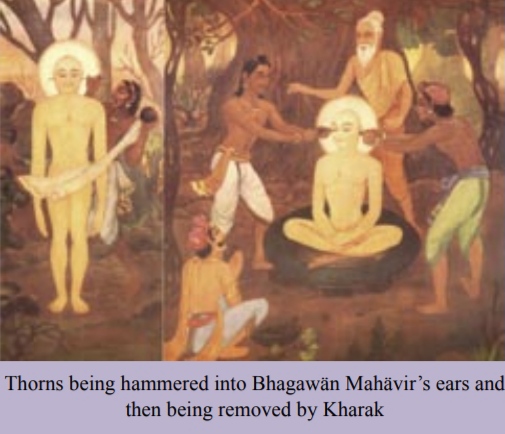
Thorns being hammered into Bhagawän Mahävir’s ears
3.4 Keval-jnän and Nirvana
Mahävir-swämi practiced severe austerities and deep meditation for a period of twelve and a half years. During this period, he resided in parks, forests and deserted places, and bore all the obstacles and tortures patiently and bravely. He observed fasts from a single day to up to six months. He had now reached the highest stage of meditation. He reached the village Jambhikä and stayed on the banks of the river Rujubälukä. At that time, he was observing a fast of two days. In order to annihilate the lingering remnants of the destructive Karma Bhagawän Mahävir sat down in the ‘cow-milking’ posture. His mind was absorbed in the highest type of meditation, and by destroying all his Ghäti Karma completely; he attained absolute knowledge on the tenth day of the bright
half of the month of Vaisakha. He became omniscient, comprehending and visualizing everything in the whole universe. Being free from all Ghäti Karma, he now became an Arihanta.
The thrones of Indra and the other heavenly gods received tremors the moment Bhagawän Mahävir attained omniscience. Immediately hosts of gods thronged there to celebrate the fourth Kalyänak or auspicious occasion.
They constructed a divine Assembly Hall known as Samavasaran for Bhagawän Mahävir’s first sermon. He delivered the first sermon at night when only the gods were present. Then, Bhagawän traveled to Päväpuri and stayed in the garden named Mahäsen. The gods constructed another Samavasaran hall. Sitting under the Ashok tree, Mahävir delivered a sermon in Ardha- Mägadhi.
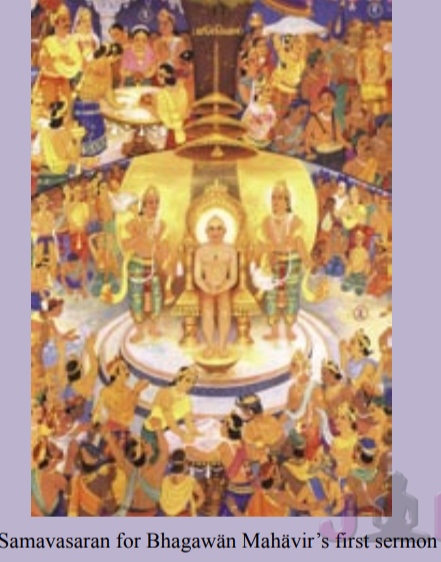
Samavasaran for Bhagawän Mahävir’s first sermon
Eleven Learned Brahmins Initiated as Ganadhars
Bhagawän Mahävir, endowed with many Atishaya or distinguished attributes, delivered a soul-stirring and heartfelt sermon in the assembly of gods, human beings, and animals. Even though a great sacrifice was in progress simultaneously in another part of the city, huge crowds were seen going in the opposite direction towards the Samavasaran. Indrabhuti of Gautam Gotra, the chief priest, was told about Bhagawän Mahävir’s Samavasaran. On hearing this, his vanity was hurt and he decided to put to test the so-called omniscience of the saint. He, therefore, decided to visit the Samavasaran accompanied by his disciples.
Mahävir called him by his name and without being asked resolved his doubts about the soul, upon which Gautam along with his 500 disciples accepted monk hood. Hearing this, the remaining ten learned scholars came there and having their secret doubts resolved, accepted initiation with 4400 disciples. Mahävir established the four-fold Sangha and preached the path to liberation. 11 learned Brahmins became his principles disciples and are known as Ganadhars.
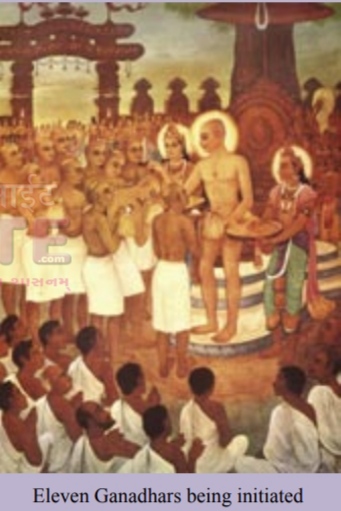
Eleven Ganadhars being initiated
Bhagawän Mahävir’s Last Sermon at Päväpuri lasting Forty-eight Hours and his Final Liberation
During thirty years of his life as a Tirthankar, Bhagawän Mahävir preached his gospel of Ahimsä to millions of people and initiated thousands of disciples into monk hood. At the age of seventy-two, he came to Päväpuri to spend his final monsoon season. In the month of Ashwin he observed a fast for two days, taking neither food nor water, sat in the lotus posture on a golden lotus and delivered his last and longest sermon, lasting for forty- eight hours, before the four-fold Sangha.
This sermon was compiled in the Jain scripture known as Uttarädhyayan Sutra. In the early morning of the new-moon night, the remaining four types of non-destructive Karma were destroyed. And thus with all the eight Karma completely annihilated, his soul soared high and reached the pinnacle of Loka and went to the permanent abode of Siddhas, never to return again. And thus the soul achieved the highest goal of Liberation.
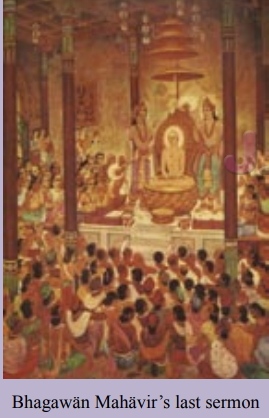
Bhagawän Mahävir’s last sermon
Funeral Rites performed by heavenly gods and human beings
All the eighteen rulers of the various states were present at the time of Bhagawän Mahävir’s Nirvana. When the light of knowledge was extinguished, they lighted numerous earthen lamps. And it was since
then that the Festival of Lights, called Deepävali, is being observed in India. Indra and the other gods flew down to earth to celebrate the fifth Kalyänak. They bathed his body with holy waters, applied sandal paste, dressed the body in rich garments, and decked and adorned him with a crown and other ornaments. He was carried in a palanquin and millions joined the procession to pay their last homage to the great saint. There was solemn music accompanied on musical instruments. The palanquin was placed on a pyre of fragrant sandalwood. The final prayers were offered and the fire was lit.. Later, perfumed water was sprinkled to extinguish the fire. After the final rites were over the gods carried the molars and the bones to heaven.
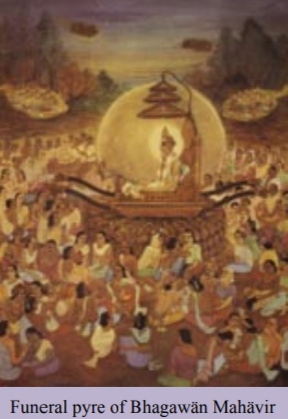
Funeral pyre of Bhagawän Mahävir


